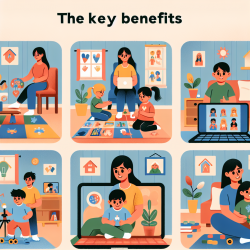Introduction
In the realm of pediatric health, the importance of understanding the impacts of hospitalized isolation on children cannot be overstated. A recent study, "Low Motor Dexterity and Significant Behaviors Following Hospitalized Isolation in Children," sheds light on how isolation affects motor skills and behavior. This blog aims to help practitioners improve their skills by implementing research outcomes or encouraging further research.
Understanding the Study
The study involved four pediatric patients who had undergone isolation within a hospital. They completed the Box and Blocks Test of gross manual dexterity and the Behavioral Assessment System for Children, Third Edition (BASC-3). The results were striking: all participants displayed lower gross dexterity levels than normative data, and three out of four participants showed clinically significant behavioral measures.
Key Findings
- All participants showed lower manual dexterity scores compared to their age- and sex-matched norms.
- Three participants exhibited ipsilateral-dominated activation in the motor cortex, indicating neuroplastic changes.
- Behavioral assessments revealed clinically significant or at-risk scores in three participants, suggesting emotional and social developmental concerns.
Implications for Practitioners
These findings highlight the need for targeted interventions to address the negative impacts of hospitalized isolation on children. Practitioners can implement the following strategies:
- Early Intervention: Incorporate motor skill and behavioral assessments early in the treatment process to identify and address deficits promptly.
- Multidisciplinary Approach: Collaborate with occupational therapists, psychologists, and educators to create comprehensive intervention plans.
- Parental Involvement: Engage parents in the therapeutic process to ensure continuity of care and support at home.
- Further Research: Encourage ongoing research to explore long-term effects and develop evidence-based interventions.
Encouraging Further Research
While this study provides valuable insights, it also underscores the need for further research. Longitudinal studies with larger sample sizes can help elucidate the long-term impacts of isolation and refine intervention strategies. Practitioners are encouraged to stay informed about emerging research and incorporate new findings into their practice.
Conclusion
Understanding the effects of hospitalized isolation on children's motor skills and behavior is crucial for improving pediatric outcomes. By implementing research-based strategies and encouraging further investigation, practitioners can make data-driven decisions that enhance the well-being of children in their care.
To read the original research paper, please follow this link: Low Motor Dexterity and Significant Behaviors Following Hospitalized Isolation in Children.










